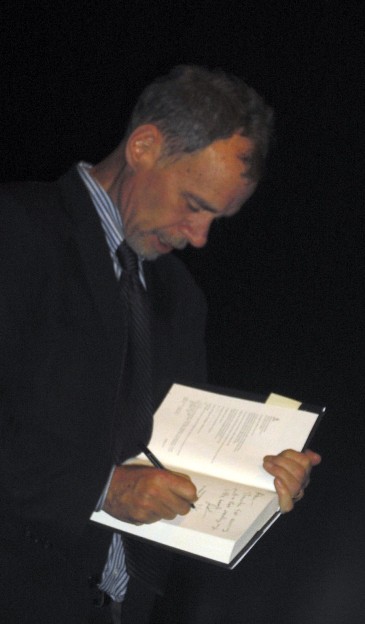David Carr Gives the Straight Dope on News Media
By Staff in News on Nov 14, 2011 4:20PM

David Carr (Image Credit: Rachel Gross)
By Rachel Gross
David Carr has a voracious appetite for media—Twitter, Facebook, blogs, news articles—chewing it up and spitting it back out in punchy, digestible tidbits for the rest of us like it’s his job.
In fact, it is his job. The grizzled, gravelly-voiced Carr is a media columnist for The New York Times, where he writes an article every Monday in the business section. Carr's stories have included an investigation into the Sam Zell era at Tribune Co., and a manifesto in support of Twitter. Last Wednesday, he graced the floor of Francis W. Parker School along with Mother Jones magazine co-editor Clara Jeffery for a talk entitled “New Frontiers in Journalism,” as part of the Chicago Humanities Festival.
Between his column, his pop culture coverage, and his work for the Times' blog Media Decoder, Carr has become somewhat of an authority on the ever-evolving state of modern media. The darling of the documentary Page One: Inside the New York Times, he is known for giving straight answers to questions that might make other, less grizzled journalists scan the room for a quick escape. For instance: “Do you think if the Times were being created from scratch, it would consider being a nonprofit?” Jeffery asked. She was thinking of listener-supported radio programs that rely on a loyal fan base, like NPR. Carr shook his head. “I just don’t see it,” he said.
The closest the Times has come to operating like a non-profit - though in recent years, it might as well have been, he joked - has been its relatively-new paywall system. Carr, whose haunting memoir Night of the Gun weaves together investigative journalism with candid autobiography, likes to leverage his past experience to shed light on the current state of news; those who get around the paywall system by linking through blogs and Twitter are essentially “doing drive-bys,” he said. But the wall is porous: readers are currently given a set number of free articles per month. “It’s only when you’re hanging around more than 20 times that we’re like, ‘hey, show us some sugar!” he said, to laughter.
One point Carr made that should resonate with non-media industry buffs alike is the undeniably addictive quality of our ever-growing media consumption. Though we may feel compelled to spend hours navigating Twitter’s forest of mirrors, there comes a point when doing so is no longer productive (nor, perhaps, humanly possible). There is always more to consume, and—especially for a former junkie—the key is coming to terms with the fact that while accessible information may very well be endless, time and the human mind are not.
“The media world is like a Labrador retriever that always needs your attention,” said Carr. “But you’ve got to put it down, sometimes.”